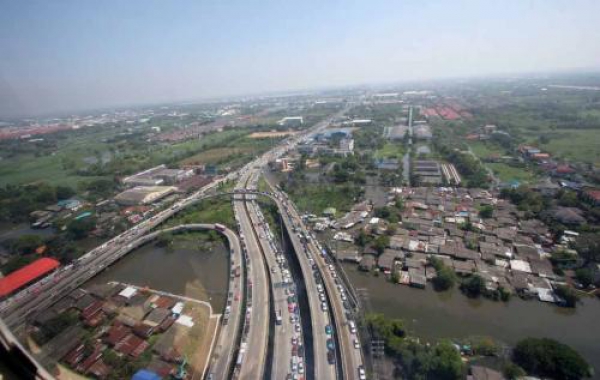The main driver of these plans is the government's planned high-speed train and improved rail system, plus construction of a major highway, which will turn Phitsanulok into the logistics hub of the lower North.
The major road - planned under the nationwide infrastructure programme - will cross the Indochina junction and link neighbouring ASEAN countries. For example, Phitsanulok will facilitate the transportation of goods to Myanmar via Mae Sot to the west, while trucks will be able to link eastwards as far as Da Nang in Vietnam.
Sansiri, AP (Thailand), CP Land, Land & Houses and Supalai all have plans for residential projects in Phitsanulok.
CP Land, a property arm of the Charoen Pokphand group, has already launched condominium projects worth up to Bt800 million under the Kalapapruk brand in the central business district of the provincial capital.
AP (Thailand), meanwhile, plans to launch its first Phitsanulok condominium project, worth Bt700 million, in the middle of next month.
Sansiri has acquired land locate close to CentralPlaza in the provincial capital, and plans to launch residential projects in the first half of next year.
Land & Houses and Supalai both also plan to launch projects in the province during the course of next year.
Phitsanulok's deputy governor, Boontham Lertsakekasem, said a number of property developers from Bangkok had demonstrated their interest in expanding their investment to Phitsanulok by acquiring land in the central business district and within the ring road since early this year.
The resulting strong demand has boosted land prices by between 50 and 100% in some locations eyed by developers, he said.
"Residential developers are following the move by retail businesses, which began to expand their investment in the province two years ago," he added.
CentralPlaza, Home Products, Thai Wasadu, Big C and Tesco Lotus all now have branches in Phitsanulok, with Tesco Lotus having two outlets.
Logistics and services hub
Boontham said Phitsanulok's strategy is to become the logistics and services hub of the lower North, given its ideal position as a transportation link between four countries: China, Myanmar, Vietnam and Malaysia.
"We are the East-West corridor and the North-South corridor in this region. When the first phase of the high-speed rail route is constructed, it will run from Bangkok to Phitsanulok. This will help fulfil our goal to make the province a gateway to ASEAN under the ASEAN Economic Community," he said.
In line with the province's strategy, not only will more retail and residential projects be launched in Phitsanulok, but other service businesses will also want to expand their investment in the province.
"Chinese investors have expressed interest in opening a warehouse in Phitsanulok to serve as a logistics hub for products imported from China at Mae Sai in Chiang Rai province, then heading down to Bangkok," said the deputy governor.
CP Land president and CEO Sunthorn Arunanondchai said the company is negotiating with Chinese investors interested in property-sector investment, especially in warehousing, over the establishment of a joint-venture business in Thailand.
"They are interested in investing in the provinces, and especially in Phitsanulok," he said.
AP (Thailand) chief marketing officer Vitakarn Jantawimol said the firm had decided to launch its second condominium project outside greater Bangkok in Phitsanulok, after witnessing strong demand both from locals and people moving from other parts of Thailand to work there.
A survey by the developer found an apartment occupancy rate of more than 90% in the province, with rents averaging Bt6,000 per month and an overall supply of more than 5,000 units.
"When we launch a condominium with prices up to Bt1.5 million per unit, borrowers have to pay monthly instalments of about Bt5,000 to Bt6,000. Given the demand to buy [in Phitsanulok], we decided to launch a project, under the new Aspire brand, which will be worth Bt700 million and comprise about 300 units. The launch will take place in the middle of October," he said.
Meanwhile, Bangkok Hospital has taken over a private hospital in Phitsanulok and made it a provincial branch of the company.
This will also support the province's strategy of becoming a service hub in the lower North.
Phitsanulok has a gross provincial product of Bt74 billion, some 40% of which is from agriculture, 10% from state-agency spending, 9% from industry and 8% from retail. Phitsanulok city is the official capital of the lower North, and also the education hub of the region.
The income of the province's citizens averages Bt87,000 per year.

